“What career is right for me?”
If you’re reading this, you’ve likely been asking yourself this exact question.
And, with decades of implications, it certainly shouldn’t be taken lightly. But let me assure you, we’ve all been there, and to ease your tensions a bit, most people make the wrong career choice.
According to arecent surveycommissioned by Catalyst and CNBC (conducted by The Harris Poll), half (50%) of employees intend to make a career change soon.
The pandemic was a catalyst for many to rethink their careers—53% of Americanswho quit their jobs in 2021 changed their field of work or occupation.
The purpose of this article is to help you avoid the career mistakes of the majority and instead learn how to choose a career that’s perfect for you.
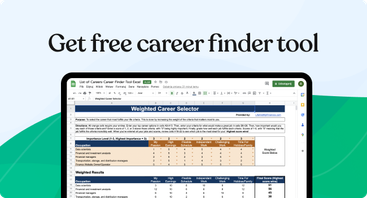
After reading the below 10 steps for choosing the ideal career, you will:
Be able to define your desired future—the definition of wealth in your career
Understand the purpose and proper use of career quizzes
Get a free list of 800+ jobs with a Career Finder Tool (Excel download)
Have a short filtered list of occupations that interest you and match your life goals
Be able to choose a particular career with confidence
And, here are some more great resources if you're not quite sure what career is best for you:
And if you're thinking about a side hustle, check out 25+ Side Hustle Apps to Make Money in 2024
1. Write Down Your Interests (Follow Your Passion)
DO NOT SKIP THIS STEP.
I did…twice. And it turned into an entire decade of floundering.
And you know what? It’s not that I completely disregarded this step. It’s just that I didn’t dwell here long enough. I didn’t give this step the time that it truly deserved.
When I was young, I loved math. I excelled in arithmetic, algebra, and—later in my childhood—calculus and physics. It only seemed natural to go into the math-focused field of engineering.
Makes sense, right?
I thought so.
It wasn’t until my junior year of college that I realized I hated building things and didn’t care how machines worked.
Not exactly the blueprint of a future engineer.
My studies and internships up to that point had been a total waste of time. I had to start over. All because I didn’t take the time to understand my interests.
Learn from my mistakes.
Take the below steps seriously.
What do you love to do?
It’s time to find your interest.
What do you have a blast doing?
What is it that makes the time fly by?
You may not think so, but there may be a career that matches your passions. Write everything down you can think of. Don’t rule anything out.
Here’s a sample list of passions:
Playing video games
Reading mystery novels
Driving
Analyzing data and finding commonalities or patterns
Playing sports
Working on cars
Analyzing business income statements
It seriously could be anything. Write down every interest!
How to turn your passion into a career
If you ask yourself, “What job is best for me?” and your interests and abilities align with a traditional job, great. Go with it (and continue to the next step).
But, perhaps your passions don’t directly translate into a well-known career field. Don’t just discount it and write it off as impossible! Your dream might be viable and could be a career that you’ll love for the rest of your life!
There are so many money-making careers today that didn’t even exist a few years ago:
Social media manager
User experience manager
Professional gamer
Virtual reality consultant
When I asked Piotrek Sosnowski, Chief People and Culture Officer of MoreGrowth, for his advice on careers, he essentially mirrored my sentiments exactly:
“Don't be too attached to a career. A big part of jobs popular now didn't exist five years ago. The best approach would be staying hungry, flexible, and eager to learn.”
If there is a demand for what you love to do, then you can likely make money there.
If you go through the process below and don’t see your interest on the list of careers, add it! Then talk to those that currently do what you want to do (Step #9).
Would they advise you to follow through with your passion? If so, ask how you can get a foot into their career field.
2. Identify What Wealth Means to You
Before you choose your career, you want to understand your current self and how you’d like your future to look. Do you:
Like to have a lot of free time to yourself?
Want to travel?
Wish to have the finer things in life? (Big house, nice cars, etc.)
In other words, what does wealth mean to you? Is it…
Working only 30 hours a week so you have time for your hobbies?
Having a remote job so you can travel whenever and wherever you want?
Earning more than $80k a year so you can live a more lavish lifestyle?
Or maybe it’s just working a job that you absolutely love!
Note what wealth means to you so that when it comes time to choose your career, you don’t inadvertently decide on a job that pulls you away from what you really want in life.
For example purposes, here’s how I define my wealthy life:
Working in my passion
Earning more than $80k a year
Having a flexible schedule that allows me to work remotely
Working independently with only moderate interaction with others
Having a job that’s challenging and changing, but won’t take over my life
(We’ll use this example case throughout the post. Be sure to write out what you’d like your future life to look like so you can work through the next steps in real-time!)
3. Identify Job Fields That Suit Your Interests
“What career suits me?” Do you love to read books quietly in your spare time? If yes, then you probably shouldn’t look into a career in sales in heavy machinery. It just doesn’t suit your interests.
This logic seems straightforward enough, but it can sometimes be challenging to understand what a particular job entails and if it aligns with your interests and temperament.
(Remember the Catalyst survey and the quitting stat we referenced in the first paragraph? Most of us don't pick the right jobs for ourselves.) This is where career quizzes can be helpful.
Take a career quiz (but don’t stop there)
When you’re young, you know there are thousands of potential career fields to choose from, but you’re likely only aware of a handful, and you probably don't know if you’re a great fit for them either. This is where career quizzes come in handy. You can easily find these quizzes online with a quick Google search.
Top free career quizzes:
Princeton Review Career Quiz
123 Career Aptitude Test
Truity Photo Career Quiz
Career Explorer (a career personality test)
My career quiz results
I took one of the free career assessment tests above for this piece. And I was honestly shocked at how the seemingly obscure 24-question quiz perfectly pegged my career interests. Remember, I first considered going into engineering. My second career choice was finance.
Take a look at my quiz results:
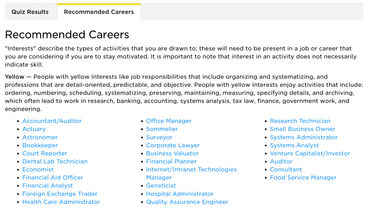
They nailed it. Not only was I in finance, but I became a financial analyst and later became a finance manager.
The quiz lines up perfectly with the career path I chose. Pretty impressive.
This isn’t a promotional post for career quizzes, though.
The problem with career quizzes
Here’s where I insert my word of caution.
Remember I said that I made two career mistakes? The first was engineering. There’s no doubt about that mistake. The second was to become a financial analyst.
This quiz literally just told me I should go into a field that I consider to be a mistake today. How is this possible?
This career lined up perfectly with my personality and occupational interests. Therefore, it should be a great career choice, right?
Wrong.
I didn’t hate my job—mainly because I was good at it, and it suited me. But I certainly didn’t love it.
If you want to love what you do, don’t just trust the quizzes. They’ll get you close to the right answer, but it’s still on you to do a proper self-assessment of your passions and your desired future.
Browse a list of careers (our free tool)
With a decision as big as choosing a career, I suggest you download our free career finder tool.
No strings attached. No sign-ups. No spammy emails. Just a helpful spreadsheet of jobs to help you in your search.
Download the Free Career Finder Tool here
For starters, browse the tool and take a look at some careers you think you might be interested in. Get familiar with what’s there.
For the remainder of this guide on how to choose a career, we’ll walk you through this tool and explain how you can properly use it to choose your future career.
Consult with a career center
Still feeling lost in finding a career that’s right for you? I’d recommend consulting with a career center.
If you’re attending college, there’s likely a career coach available to you on campus. Just call or visit your administration office, and they can direct you to someone who can help.
A career campus can help you with:
Career coaching
Career exploration by degree
Labor market research
Job search strategies
Interview preparation
Networking advice
Resume writing
Internships
4. Search Careers by Personality
“What job would I be good at?” This is another common question of career seekers everywhere.
To discover this, I’d encourage you to assess your personality. Namely, would you identify yourself as an introvert or an extrovert?
Let’s use a simple example as a guide: You walk into a room with 20 people you have never met before. What is your reaction?
You’re terrified. Either you turn and leave, or you stay on the outskirts of the room and avoid eye contact.
You’re exhilarated. There are just so many people to meet and learn about!
If you relate to number one, you’re an introvert. You’d rather be by yourself than be forced to talk to a bunch of people.
If the large group of people exhilarates you, you’re obviously an extrovert. You love those rooms full of folks. It’s the empty room that terrifies you.
These are the extreme bookends of personalities. It could be that you’re somewhere in the middle as well. (Don’t worry, there are jobs that suit that too!) B
y understanding if you’re an introvert or extrovert, you can quickly filter out a number of jobs and get closer to the career that’s for you.
The first basic step in selecting an occupation is: Filtering on your personality
If you haven’t already, open up the Career Finder Tool. Hover over the title “Personality Needed” and filter only for your personality. All occupations with the opposing personality will be filtered out.
After this initial step, we’ll still have hundreds of jobs listed, which is obviously too many. Don’t worry. We’ll continue to filter down as we walk through the steps for how to choose a career path.
Example case: Filtering by personality
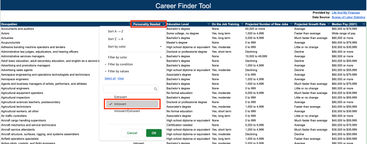
For me (if you recall, I’m the example case for this exercise), I’d rather work independently. In other words, I’m an introvert. So, I made this selection in the Career Finder Tool. And that’s it for this step.
Painless, right?
Time for the next step in choosing a career path!
5. How Much Schooling Are You Willing to Take?
Finding the right career might depend on how long you want to stay in school.
If you’re struggling to get through four years of college to get your bachelor’s degree, you likely shouldn’t choose a career that requires a master’s or doctoral degree. In fact, maybe you should stay open to careers that only require a high school or associate’s degree.
Certain careers might sound exciting, but if you’re not qualified with the appropriate degree or certifications, then there’s basically no chance for you to land that role. It’s better to filter on your desired education level now.
In the Career Finder Tool, find the header “Education Level”. Deselect any degree that you don’t wish to pursue. Keep the remaining options checked.
Example case: Filtering by education level
Education attainment goes hand in hand with salary potential. Most employers and online postings still require some degree. However, the pandemic seems to have reset the hiring process and degrees aren’t used for screening as much as they were before COVID-19.
For me, I wanted to get into my career quickly and gather up experience rather than stay in school to get a master’s or doctoral degree. So for my career finder exercise, I’m deselecting “Master’s degree” and “Doctoral or professional degree”.
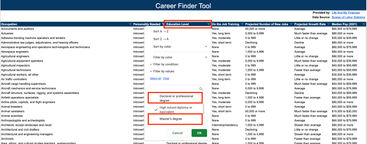
6. Evaluate the Growth of the Careers
This is an important one. While a job might seem like the perfect fit, you don’t want to hop in with both feet only to have the entire career field disappear in five years, leaving you with irrelevant experience and forcing you back to school on a new career path.
Ideally, you want a career field that’s growing quickly. At the very least, you’ll want to avoid one that’s shrinking.
You can filter this in the Career Finder Tool: Header name, “Projected Growth Rate”.
Just click the header, and deselect “Decline” and potentially the other slow growth options as well. I’ll leave those selections up to you.
Example case: Filtering by growth rate
I didn’t want to be in a stale job. I wanted a growing career with lots of options for advancement. For this reason, I’m filtering on “Faster than average” and “Much faster than average”.
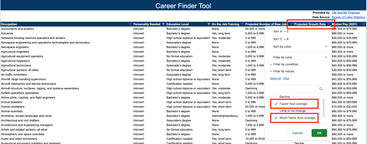
7. How Much Do You Want to Earn a Year?
Notice I saved this one for the end of our analysis? You may have read thestudy by Daniel Kahneman and Angus Deaton titled, “High Income Improves Evaluation of Life, But Not Emotional Well-Being”.
This study states that a rise in income improves emotional well-being, but only up to a salary of $75,000 a year (equivalent to roughly $100,000 today). Beyond that, there’s really no increase in satisfaction or happiness.
Far too many people (including myself) chose a career strictly on the potential paycheck. The big paydays sound great when you’re 20, but it’s a recipe for disaster when you’re 35 and literally trying not to claw your eyes out at your desk.
Don’t make this mistake. Be honest with yourself.
How important is money in your career? Do you need to be a high-earning individual to be happy? Maybe you do. That’s completely fine.But be sure you don’t choose a career based on your dad’s friend that seems happy and drives a Ferrari.
You’re not him. You might hate what he does, and money won’t suddenly make you like your work.
Choose a career because you’re going to love it
A quick note here. Just because the Career Finder Tool says a particular job pays $40,000 doesn’t mean that’s the case for every job in every area. Be sure to keep your options open here.
Then do your detailed research (Step #9) to verify the compensation of the careers you’re interested in. Open up the tool and select the “Median Pay” header. Deselect any wage range you’re not interested in.
Example case: Filtering by median pay
For me, I was interested in earning more than $80k a year. Based on my public service announcement above, I should keep my options open and keep the $60k–$79k jobs as well as the $80k+ jobs. But for the purposes of showing you succinct results, I’m going to filter on only the $80k+ careers.
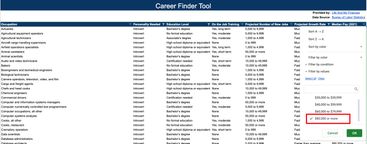
8. Narrow It Down
What career are you meant for? We’re getting close to the end result here.
At this point, you should have a list that’s roughly 40 jobs or fewer. Read through the list of careers and filter out any that you’re absolutely not interested in. Try to get the list down to roughly 15 or fewer if you can.
Example case: my career results
Below are my results.
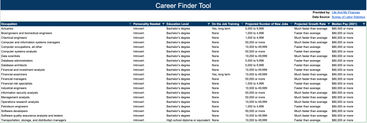
Upon reviewing my results list, I realized I could quickly filter out the engineering, database, and software roles.
That quick filter left me with roughly 10 career results, which is quite manageable for our final steps.

9. How To Decide on a Career—Interview Those That Have It
At this point, you’ve got a solid list of career ideas.
So what job should you do? Where do you take it from here? Just take a solid guess and go with it?
If you’re nodding, please don’t admit it to anyone. Of course you don’t just guess!
You’ve got to dive into each one of these careers!
How to start looking into a career
Deciding on a career is likely the most significant decision you’ve ever made in your life. And it’s going to impact half of your waking hours for decades to come.
You’ve already done a bit of a self-assessment to get your current list of career options. Now it’s time to poll the audience.
Ask friends and family
Some say that no one knows you better than you. While that’s true most of the time, sometimes we’re so clouded in our own world that we can’t see what a terrible assessment we’re making! I can attest to this with my initial engineering career choice. (Oh, and my first wife. But that’s a story for another time.)
All this to say, feel free to poll your friends and family on the career options you’ve selected.
Do they think your personality fits the roles you’ve selected?
Would they say your interests align with certain careers more than others?
Will they call you out on only selecting a career for the money?
Bring your list to them. Ask questions. And truly listen, even if it is your annoying mom that doesn’t seem to understand anything about this century.
Get more information from LinkedIn
Your friends and family might be helpful, but don’t stop there. They don’t have actual experience in the career field you’re looking at.This is where LinkedIn comes in.
Here’s what you do. Just open up your LinkedIn profile (if you don’t have one, make one), and in the upper left, search for the job title on which you want more information.
LinkedIn will provide you with a list of people with that exact job.
Whether you know them or not, send them a message! Explain to them that you’re a student and think you might ultimately like their job in the future, but you’d like more information from someone in the role.
Ask them:
What they like about their job
What they don’t like about their job
What they wish they knew back in college about this career
If they had to choose a different career, what would they choose, and why
Out of every 10 people you message, you might only receive 2–3 responses, so don’t be shy! Send out a couple dozen messages for each career you’re interested in!
Get the unfiltered advice from Reddit
Finally, hop into Reddit. People won’t hold back here. They’ll tell it how it is.
Just click into Reddit’s search bar and ask:“Is [enter job here] a good career path?” T
o test this, I entered:“Is Finance Manager a good career path?”
I discovered that someone asked this same question just 10 months ago.
There were roughly 6–7 helpful responses there, and the answers weren’t simply yes or no. People gave their experiences—where they started and where they are now in their careers. They discussed pay, hours worked, and what they typically do in their day-to-day.
Amazingly helpful.
Do this with each one of the careers that interest you.
10. Making Your Final Decision—What Career Is Best for You?
The intention of this post was to teach you how to choose a career. I’m convinced you’ll be ready to do just that after reading through this 10th and final step.
So—the big question you’re asking yourself—“What job should I have?”
After working with the Career Finder Tool and following this 10-step process, you should have a concise list of career options. But, you might not know exactly where to take it from here.
How do you decide on a career? Do you just pick one? Do you somehow rank them for different criteria?
Enter the Weighted Career Selector Tool—
The weighted career selector tool—What is it and how to use it
The weighted career selector is part of the career sheet you already downloaded. The career listing is on the first tab, and the weighted selector tool is on the second tab. It looks like this:
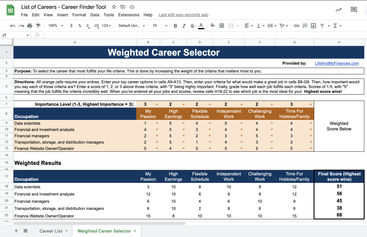
And if you’re still scratching your head, wondering how to know which job is right for you, don’t worry. This career selector process will help you quantify how well each career aligns with all of your criteria. And, it’s a weighted system so that you can put greater importance on some criteria more than others.
Here’s the step-by-step of how it all works:
Enter your short list of careers in cells A9–A13
Enter your criteria in cells B8–G8 (be sure to delete my criteria, by the way; this should be what’s important toyou)
Assign each criterion with a level of importance (this goes above each criteria label in cells B7–G7). If your passion is highly important, give it the highest rating of 3. If pay is least important, give it the lowest rating of 1.
Finally, grade how well each job fulfills each of your criteria (in the cell block of B9–G13). If a career doesn’t fulfill one of your criteria at all, give it a rating of 1. If it fulfills it incredibly well, give it the highest rating, a 5.
Once you perform steps 1–4, your weighted results will appear in cells B18–G22. And, your total weighted scores will appear in cells H18–H22.
Which of your short-listed careers got the highest score? This, based on your weighted criteria and grading, should be the career of your future!
My story: I wish I had this tool when I was in college
A quick recap of my career mistakes here:
My first career mistake: Engineering
My second career mistake: Financial Analysis (a lesser mistake, but still a mistake nonetheless)
So what’s my career now?
I own and operate this personal finance website. It’s my true passion, and it’s something that the career quizzes could never have identified. They’ll get you close, but it’ll take your introspective look to identify your true career.
Check out the image of the weighted career selector again. Did you see the winner on my list of occupations?
“Finance Website Owner/Operator”
I slipped it in there on my own, and it won the contest, hands down. Too bad it took me 15 years of my life to identify.

If you have an unconventional career choice that might just check all the boxes, be sure to include it, weigh it, and grade it. Perhaps you should turn it into your next career!
Bonus: Careers For The Undecided
You read it all and followed the steps, but you still have no idea what career is right for you.
Take comfort in this amazing bit of advice from Jen Nicol, Chief People Officer at MillerKnoll:
“People put so much pressure on themselves to pick the right career. Rather than carrying the weight of "getting it right", go and explore. Try jobs in different focus areas, industries, and even countries. See what you really like and, as importantly, what you don't like. By exploring, you will quickly find the path you want to travel.”
You can take more time and continue reassessing, or you just make the best choice you can at this moment.
If you’re still undecided, take a look at some of the best careers listed below.
They’re growing, the pay is excellent, and you can likely qualify for them.
If one interests you, and your friends and family think you’d enjoy it and do well, it might just be worth pursuing.
Top careers for the undecided
Data scientist
Diagnostic medical sonographers
Financial examiners
Financial managers
Flight attendants
Fundraisers
Health specialties teachers, postsecondary
Healthcare social workers
Information security analysts
Logisticians
Management analysts
Market research analysts and marketing specialists
Medical and health services managers
Medical scientists, except epidemiologists
Nurse practitioners
Nursing instructors and teachers, postsecondary
Occupational therapists
Occupational therapy assistants
Operations research analysts
Personal financial advisors
Physical therapist assistants
Physical therapists
Physician assistants
Respiratory therapists
Social and community service managers
Software developers
Software quality assurance analysts and testers
Speech-language pathologists
Statisticians
Veterinarians
Web and digital interface designers
Web developers
Best of luck to all of you in your career selections! If you made it through this post and made an honest assessment, I have confidence that you’ll choose the career that’s best for you.
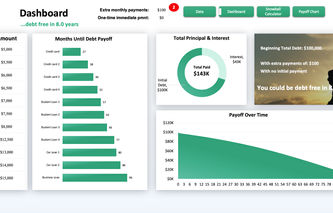
.jpg)



